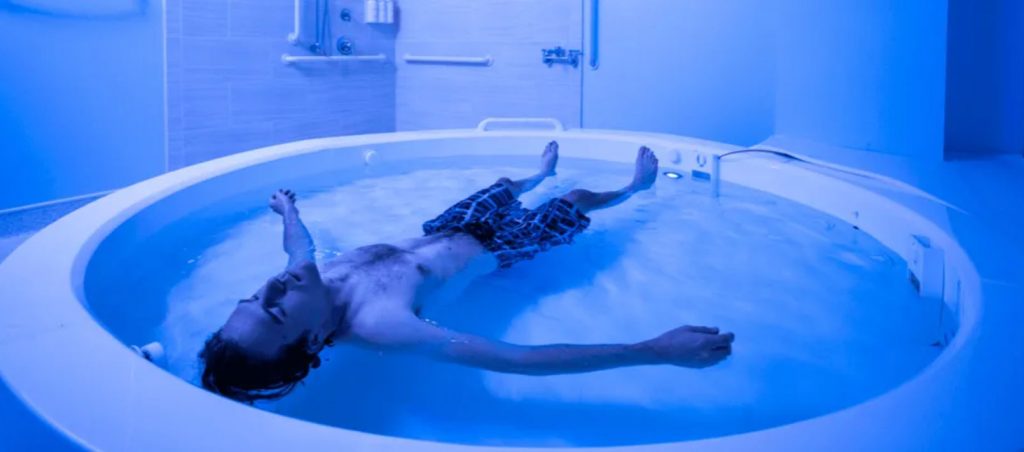Home » Fighting Falsehoods » Therapeutic Floating for Stress, Anxiety and Pain Management
Therapeutic Floating for Stress, Anxiety and Pain Management

Benefits of Therapeutic Floating
“Base rates of stress and anxiety are off the charts,” Dr. Feinstein explains. “We’re living in a day and age where our nervous system is bombarded with stimulation. It’s a natural consequence of modern times and modern technology, 24-7 connectivity. Our nervous system is woefully unprepared for this stimulation.”
Dr. Feinstein became interested in Floatation REST – Reduced Environmental Stimulation Therapy – in response to the need for new therapies and technologies to respond to this new era in which the nervous system is inundated with stimulation.
The Floating Environment: What Is It?
Dr. Feinstein takes us on a tour of the therapeutic floating experience. He explains that they create a specialized environment devoid of external stimulation like traffic or human conversation.
The pool his team created at the Laureate Institute for Brain Research is a large 8-foot circular pool, conducive to people stretching out as they float. The pool contains only 1 foot of water. The key is that they saturate the water with 2000 pounds of Epsom salt. They remove the need for your body to thermo-regulate by setting the water temperature to 94-95 degrees.
The room is spacious, sound proof, light proof, and temperature and humidity controlled. The goal is to remove as much external stimulation as possible. “It’s a very serene relaxed environment, perfectly calibrated to minimize stimulation of the human nervous system,” says Dr. Feinstein.
He explains that most of us don’t realize how much stress we carry in our body. Therapeutic floating is a way to manage that stress.
We discuss whether the magnesium salts in which subjects serenely float are involved in any of the clinical outcomes. One of the consistent physiological results Dr. Feinstein has found is an average of a 5-point drop in the systolic blood pressure and a 10-15 point drop in diastolic, measured during the floating session.
As one who is challenged with Binge Eating Disorder, I questioned whether Dr. Feinstein would be interested in studying that potential area (specifically anxiety-related impulsive eating). Check out his response!
Therapeutic Floating in Athletics: A Testimonial
Elite athletes, including Tom Brady, Steph Curry and Wimbledon winner Novak Djokovic are taking advantage of therapeutic floating for both mental and physical recovery post-workout or after competition. These athletes are finding that therapeutic floating is helping their concentration levels.
I must admit that my own recent floating experiences have been incredible.
And if you are interested in learning more about research efforts for clinical floating, as well as potentially finding a commercial floating center near you, please see clinicalfloatation.com
Disclaimer: Neither I, Dr. Feinstein nor the True Health Inititative are endorsing, nor have any financial relationship with, any of the floating centers found through the web link above. Please always do your own due diligence and discuss any health or medical related questions with your licensed healthcare provider.
Enjoy the interview! I believe you will learn a ton and a half about this fascinating stress management modality — one that is well aligned with the mission of THI. Click here to watch it now.

